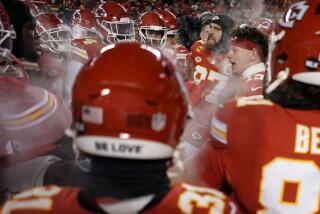It takes sweat and a lot of practice to broadcast the Super Bowl
- Share via
NEW ORLEANS — Lance Barrow doesn’t leave anything to chance.
Striding out onto the field of a dimly lighted, virtually empty Superdome just days before Super Bowl XLVII kicks off, the husky Texas native explains why CBS needs five times as many cameras as it would for a regular-season game.
“I just want to make sure we have everything covered,” says Barrow, who as CBS’ lead football producer will be quarterbacking the Sunday broadcast for the 100 million people watching in living rooms and bars across the country as the Baltimore Ravens take on the San Francisco 49ers.
Barrow will have at least 20 of the network’s 62 cameras positioned on the field, with dozens more in the stands — including a couple parked in the highest reaches of the 72,003-seat arena.
TIMELINES: Super Bowl History | Best Super Bowl commercials
He’ll watch all those cameras from inside a trailer nearly 20 yards long stuffed with $30-million worth of video equipment that’s parked in back of the Superdome. His Sunday will be spent in his captain’s chair staring intensely at a wall of 167 monitors that will show him and his production team every angle of every play.
“It’s the biggest event and biggest production in all of television,” said Sean McManus, the chairman of CBS Sports. “The amount of coverage and the complexity of coverage far exceeds anything we’ve ever done.”
CBS pays the NFL an average of $650 million per season for its package of games, and getting to broadcast a Super Bowl every three years (CBS rotates with Fox and NBC) is one huge payoff. Big ratings will just about guarantee that CBS will finish first in overall viewers and the coveted demographic of 18-to-49-year-olds for the 2012-13 television season.
Not only is CBS charging advertisers such as Budweiser and Pepsi about $4 million for a 30-second commercial, it is also using its coverage as a platform to promote the entire network. CBS took over Jackson Square in the French Quarter, from where it aired many of its shows in the days leading up to the big game, including its morning and evening news programs.
CBS won’t say how much it costs to produce the Super Bowl. However, an executive at a rival network that is also in the Super Bowl rotation said it typically costs more than $1 million.
“It is a fraction of the overall revenue that is generated on this day,” is all McManus would say.
For Barrow, this year’s Super Bowl is a homecoming of sorts. The first Super Bowl he worked, in 1978 — as an assistant to broadcaster Pat Summerall — was also played in the Superdome. For that game, CBS used only 28 cameras.
Of course, there’s more to producing the Super Bowl than lots of cameras, generators and trailers — although the network has plenty of those.
Barrow spent much of the last two weeks studying game film of the Ravens and 49ers to familiarize himself with how the teams play. Knowing how they run their offenses will help him anticipate the flow of the game. That is crucial when it comes to determining how many replays can be shown between plays or how much time he’ll have for crowd shots.
Like a wedding, there are also a lot of rehearsals before the opening kickoff. Even the coin toss to determine who will receive the ball first got a dry run. The 49ers and Ravens team captains weren’t required as the head official for the game practiced his toss and Barrow’s crew worked the angles to get the best view of the coin twirling through the air and landing on the field.
“We rehearse everything,” said Barrow.
A local high school team — the Rummel Raiders from Jefferson Parish — was brought into the pre-game action as stand-ins for the Ravens and 49ers. As a practice run for the CBS production crew, the Raiders executed plays the two teams will likely use.
“We will play like we are on the air for two hours,” Barrow said. “You have all this equipment and all these cameras so you don’t want to walk in here on Sunday morning having to make sure everything is working.”
CBS has also been assembling hours of clips from previous games to show between plays when appropriate. For example, the network has the first pro quarterback sack by Ravens middle linebacker Ray Lewis (who is playing in his final game), which just happened to be against Jim Harbaugh, who is now head coach of the 49ers.
“What we want to do is make sure that we have everything that might come up in this game,” Barrow said, even though he knows much of the hard work of his producers will be for naught. “If we get lucky we’ll get 2% of it on the air.”
On Super Bowl Sunday Barrow will head to the truck a good 61/2 hours before kickoff and start chugging iced tea. He estimates that he’ll consume gallons of it during the game, but having dropped nearly 100 pounds over the last 18 months, he will not overindulge on the doughnuts and pizza that typically fill production trailers.
“I have to really watch myself because I can go crazy,” acknowledged Barrow.
For all the focus Barrow and his crew will put on getting the game just right, he knows there’s one thing even more important to his bosses at CBS than nailing the winning touchdown.
“You don’t ever want to ever miss a commercial, especially in a game like the Super Bowl,” he said. “That’s our job.”
MORE
INTERACTIVE: TVs highest paid stars
INTERACTIVE: YouTube’s viral videos of 2012
PHOTOS: Hollywood back lot moments
More to Read
Sign up for Essential California
The most important California stories and recommendations in your inbox every morning.
You may occasionally receive promotional content from the Los Angeles Times.











